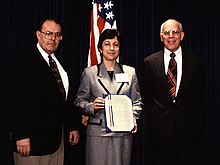John H. Gibbons (scientist)
| John Howard Gibbons | |
|---|---|

John Gibbons (right)
|
|
| Born |
January 15, 1929 Harrisonburg, Virginia |
| Died | July 17, 2015 (aged 86) Crozet, Virginia |
| Residence | The Plains, Virginia |
| Citizenship | American |
| Nationality | USA |
| Fields | Math, Chemistry (B.S.) Nuclear Physics (Ph.D.) |
| Institutions | Congressional Office of Technology Assessment |
| Education |
Randolph-Macon College, B.S. Duke University, Ph.D. |
| Known for | Assistant to the President for Science and Technology and Director of the White House Office of Science and Technology Policy; Director of the Congressional Office of Technology Assessment |
John Howard "Jack" Gibbons (January 15, 1929 – July 17, 2015) was an American scientist, nuclear physicist, and internationally recognized expert in technologies for energy efficiency and energy resource conservation. He served as the Assistant to the President for Science and Technology and Director of the White House Office of Science and Technology Policy under President Bill Clinton from 1993-1998.
Jack Gibbons received two bachelor's degrees, one in mathematics and the other in chemistry from Randolph-Macon College in 1949, and a doctorate in nuclear physics from Duke University in 1954.
Following his formal training in physics, Dr. Gibbons spent 15 years at Oak Ridge National Laboratory. At Oak Ridge, he studied the structure of atomic nuclei, with emphasis on the role of neutron capture in the nucleosynthesis of heavy elements in stars. In the late 1960s, at the urging of Alvin M. Weinberg, he pioneered studies on how to use technology to conserve energy and minimize the environmental impacts of energy production and consumption.
In 1973, Dr. Gibbons was appointed the first Director of the U.S. Federal Office of Energy Conservation. In 1975 he returned to Tennessee to direct the University of Tennessee Energy, Environment and Resources Center.
Dr, Gibbons was appointed In 1979 to direct the US Congressional Office of Technology Assessment,. which provided the Congress with nonpartisan, comprehensive analyses on a broad spectrum of issues involving technology and public policy. His tenure at OTA lasted over two six-year terms, until 1992.
...
Wikipedia
